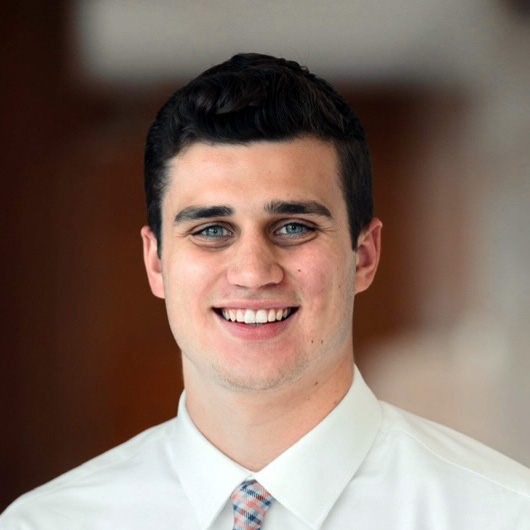The research community at the Institute includes visiting scholars, consultants, economists, research analysts, and research assistants. These scholars bring a diversity of backgrounds, interests, and expertise to research that deepens our understanding of economic opportunity and inclusion as well as policies that work to improve both.
Growing up, Sheridan Fuller was surrounded by public service. His father was a 30-year Army veteran. His hometown of Virginia Beach holds the largest active-duty miliary population in the United States. His sister is currently a doctor in the Navy.
However, it wasn’t just proximity to public servants that inspired Fuller, an Institute visiting scholar. He also fondly remembers his late father as a consumer of the news—CNN always on, a newspaper always in hand.
“Watching policymakers try to pass legislation to implement programs or rules, … it made me think, ‘Oh, government is a natural place to be in the arena, contributing to this work.’”
Those experiences led Fuller to earn a Master of Public Policy and become a Presidential Management Fellow at the Department of Health and Human Services (HHS). There, Fuller helped prepare the budgets for several public programs, including Temporary Assistance for Needy Families (TANF), adoption assistance, foster care, and child care subsidies.
At HHS, Fuller observed there seemed to be groups of people with two distinct skill sets: “One group was academic researchers who were trying to use their insights about what the evidence said to inform policy discussions. Another group, folks who came from the Hill or other federal agencies, really understood the political process and the key legislators involved,” Fuller said. “I wanted to have both skill sets, and that was the impetus for going back to grad school to get my Ph.D.”—which he did, in the human development and social policy program at Northwestern University.
Fuller’s HHS experience has since anchored his research. He studied the long-term consequences of changes to eligibility criteria for Aid to Families with Dependent Children, the precursor to today’s primary welfare program. He found that after restrictive “man in the house” rules that disproportionately excluded non-White families were repealed in 1968, participation in the program and educational attainment among Black families rose.
Now a Federal Reserve Board of Governors economist, Fuller wrestles daily with big questions about income support programs, child care, and other fiscal policy issues. That intersection of research and policy is right where he wants to be.
“If you had told me at the beginning of my Ph.D. that this is the job I would have,” Fuller said, “I would have told you, ‘This is perfect.’”






